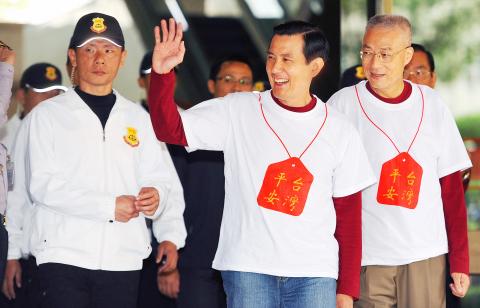President Ma Ying-jeou (馬英九) yesterday formally registered for his re-election bid, pledging that if he wins next year, he would spare no effort to fulfill his pledge of creating a “golden decade” for Taiwan, making it safer and more prosperous.
Ma made the remarks after registering his candidacy, along with his running mate, Premier Wu Den-yih (吳敦義), for the presidential election. They were the first team to register at the Central Election Commission for the Jan. 14 poll.
“I have completed the registration procedure and deposited the guarantee of NT$15 million [US$496,680]. Starting today, I will gradually carry out my campaign programs,” Ma said. “And if I’m re-elected, I’ll do whatever I can to make our country more secure, our society more stable and our people more at ease.”

Photo: Liao Chen-huei, Taipei Times
Both Ma and Wu wore specially designed T-shirts printed with an amulet design that carries four Chinese characters wishing Taiwan peace and good luck.
They were accompanied by Legislative Deputy Speaker Tseng Yung-chuan (曾永權), serving in his capacity as secretary-general of Ma’s campaign, and a group of young volunteers.
Earlier this month, Wu said he would temporarily step down from his post on Dec. 14, one month before the election, which will be held simultaneously with the legislative polls.
Candidacy registration for next year’s presidential and legislative elections opened yesterday, and will close on Friday.
Democratic Progressive Party (DPP) Chairperson Tsai Ing-wen (蔡英文) and her running mate, Su Jia-chyuan (蘇嘉全), are expected to register tomorrow, while People First Party Chairman James Soong (宋楚瑜) and his running mate, Lin Ruey-shiung (林瑞雄), are expected to register either tomorrow or Friday.
Officials from the National Security Bureau on Sunday said it would take over the responsibility for security after the presidential and vice-presidential candidates officially register their candidacies this week.
Teams will provide security for candidates from registration day to midnight on Jan. 15, one day after election day, it added.

Tropical Storm Gaemi strengthened into a typhoon at 2pm yesterday, and could make landfall in Yilan County tomorrow, the Central Weather Administration (CWA) said yesterday. The agency was scheduled to issue a sea warning at 11:30pm yesterday, and could issue a land warning later today. Gaemi was moving north-northwest at 4kph, carrying maximum sustained winds near its center of up to 118.8kph and gusts of 154.8kph. The circumference is forecast to reach eastern Taiwan tomorrow morning, with the center making landfall in Yilan County later that night before departing from the north coast, CWA weather forecaster Kuan Shin-ping (官欣平) said yesterday. Uncertainty remains and

SEA WARNING LIKELY: The storm, named Gaemi, could become a moderate typhoon on Wednesday or Thursday, with the Taipei City Government preparing for flooding A tropical depression east of the Philippines developed into a tropical storm named Gaemi at 2pm yesterday, and was moving toward eastern Taiwan, the Central Weather Administration (CWA) said. Gaemi could begin to affect Taiwan proper on Tuesday, lasting until Friday, and could develop into a moderate typhoon on Wednesday or Thursday, it said. A sea warning for Gaemi could be issued as early as Tuesday morning, it added. Gaemi, the third tropical storm in the Pacific Ocean this typhoon season, is projected to begin moving northwest today, and be closest to Taiwan on Wednesday or Thursday, the agency said. Today, there would likely

DISRUPTIONS: The high-speed rail is to operate as normal, while several airlines either canceled flights or announced early departures or late arrivals Schools and offices in 15 cities and counties are to be closed today due to Typhoon Gaemi, local governments announced last night. The 15 are: Taipei, New Taipei City, Taoyuan, Tainan, Keelung, Hsinchu and Kaohsiung, as well as Yilan, Hualien, Hsinchu, Miaoli, Chiayi, Pingtung, Penghu and Lienchiang counties. People should brace for torrential rainfall brought by the storm, with its center forecast to make landfall on the east coast between tonight and tomorrow morning, the Central Weather Administration (CWA) said. The agency issued a sea warning for the typhoon at 11:30pm on Monday, followed by a land warning at 11:30am yesterday. As of

CASUALTY: A 70-year-old woman was killed by a falling tree in Kaohsiung as the premier warned all government agencies to remain on high alert for the next 24 hours Schools and offices nationwide are to be closed for a second day today as Typhoon Gaemi crosses over the nation, bringing torrential rain and whipping winds. Gaemi was forecast to make landfall late last night. From Tuesday night, its outer band brought substantial rainfall and strong winds to the nation. As of 6:15pm last night, the typhoon’s center was 20km southeast of Hualien County, Central Weather Administration (CWA) data showed. It was moving at 19kph and had a radius of 250km. As of 3pm yesterday, one woman had died, while 58 people were injured, the Central Emergency Operation Center said. The 70-year-old